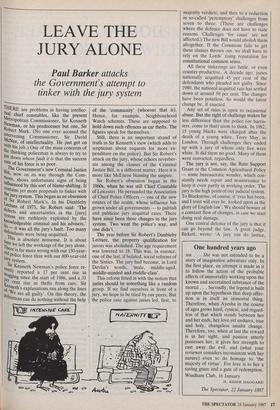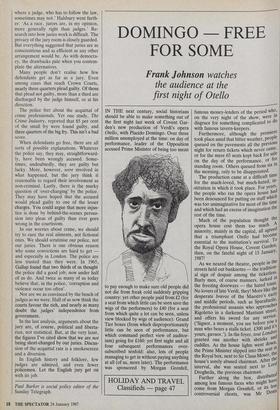LEAVE THE JURY ALONE
Paul Barker attacks
the Government's attempt to tinker with the jury system
TliERE are problems in having intellec- tual chief constables, like the present Metropolitan Commissioner, Sir Kenneth jewman, or his predecessor but one, Sir Robert Mark. (No one ever accused the ,ntervening Commissioner, Sir David mcNee, of intellectuality. He just got on with his job.) One of the main concerns of the thinking policeman is always to try to Pin down whose fault it is that the success rate of his force is so poor. , The Government's new Criminal Justice 'ill, now on its way through the Com- mons, shows unfortunate signs of being tunuenced by this sort of blame-shifting. It contains yet more proposals to tinker with the Jury system. This began as an obsession of Sir Robert Mark's. In his Dimbleby , re of 1973, Sir Robert said: 'The uefecls and uncertainties in the [jury] system are ruthlessly exploited by the v_ coWledgeable criminal and his advisers.' dit was all the jury's fault. Too many lendants were being acquitted. This is absolute nonsense. It is about `1111e we left the workings of the jury alone. There is far more wrong with our 150-year- Police force than with our 800-year-old Jury system. Sir Kenneth Newman's police force re- ,.ZntlY reported a 17 per cent rise in Per cent since the start of 1986, and a 31 cent rise in thefts from cars. Sir 7nneth's explanations run along the lines ,c/` `We are all guilty'. On this theory, the Micernan can do nothing without the help of the 'community' (whoever that is). Hence, for example, Neighbourhood Watch schemes. These are supposed to hold down such offences as car thefts. The figures speak for themselves. Still, there is an important strand of truth in Sir Kenneth's view (which adds to scepticism about requests for more ex- penditure on the police). But Sir Robert's attack on the jury, whose echoes reverber- ate among the clauses of the Criminal Justice Bill, is a different matter. Here it is more like McEnroe blaming the umpire.
Sir Robert's obsession began- in the 1960s, when he was still Chief Constable of Leicester. He persuaded the Association of Chief Police Officers — one of the new estates of the realm, whose influence has grown under all governments — to publish and publicise jury acquittal rates. There have since been three changes in the jury system. Two went the police's way, and one didn't.
The year before Sir Robert's Dimbleby Lecture, the property qualification for jurors was abolished. The age requirement was lowered to 18. This was, in essence, one of the last, if belated, social reforms of the Sixties. The jury had become, in Lord Devlin's words, 'male, middle-aged, middle-minded and middle-class'.
This reform fitted in with the notion that juries should be something like a random group. If we find ourselves in front of a jury, we hope to be tried by our peers. But the police case against juries led, first, to majority verdicts, and then to a reduction in so-called 'peremptory' challenges from seven to three. (These are challenges where the defence does not have to state reasons. Challenges 'for cause' are not affected.) The new Bill would abolish them altogether. If the Commons fails to get these clauses thrown out, we shall have to rely on the Lords' rising reputation for constitutional common sense.
All these tinkerings are futile, or even counter-productive. A decade ago, juries nationally acquitted 45 per cent of the defendants who pleaded not guilty. Since 1980, the national acquittal rate has settled down at around 50 per cent. The changes have been pointless. So would the latest change be, if enacted.
Any set of rules is open to occasional abuse. But the right of challenge makes far less difference than the police (or barris- ters, come to that) seem to think. In 1982, 15 young blacks were charged after the death of a young white, Terry May, in London. Through challenges they ended up with a jury of whom only five were white. It did them no good. Many of them were convicted, regardless.
The jury is not, say, the Rate Support Grant or the Common Agricultural Policy — some bureaucratic wonder, which con- stantly needs repair and maintenance to keep it even partly in working order. The jury is the high point of our judicial system. To Blackstone, of course, it 'ever has been, and I trust will ever be, looked upon as the glory of English law'. We should beware of a constant flow of changes, in case we start doing real damage.
One central defence of the jury is that it can go beyond the law. A great judge, Birkett, wrote: 'A jury can do justice, where a judge, who has to follow the law, sometimes may not.' Haisbury went furth- er: 'As a race, jurors are, in my opinion, more generally right than judges.' Re- search into how juries work is difficult. The privacy of the jury room is closely guarded. But everything suggested that juries are as conscientious and as efficient as any other arrangement would be. As with democra- cy, the drawbacks pale when you contem- plate the alternatives.
Many people don't realise how few defendants get as far as a jury. Even among cases that reach Crown Courts, nearly three quarters plead guilty. Of those that plead not guilty, more than a third are discharged by the judge himself, or at his direction.
The police fret about the acquittal of crime professionals. Yet one study, The Crime Industry, reported that 85 per cent of the small fry were found guilty, and three quarters of the big fry. This isn't a bad score.
When defendants go free, there are all sorts of possible explanations. Whatever the police say, they may, straightforward- ly, have been wrongly accused. Some- times, undoubtedly, they are guilty but lucky. More, however, were involved in what happened, but the jury think it reasonable to regard their involvement as non-criminal. Lastly, there is the murky question of 'over-charging' by the police. They may have hoped that the accused would plead guilty to one of the lesser charges. You could argue that more injus- tice is done by behind-the-scenes persua- sion into pleas of guilty than ever goes wrong in the courtroom.
In our worries about crime, we should try to cure the real ailments, not fictional ones. We should scrutinise our police, not our juries. There is one obvious reason why some convictions are hard to get and especially in London. The police are less trusted than they were. In 1965, Gallup found that two thirds of us thought the police did a good job; now under half of us do. And twice as many of us today believe that, in the police, 'corruption and violence occur too often'.
Nor are we as convinced by the bench of judges as we were. Half of us now think the courts favour the rich, and nearly as many doubt the judges' independence from government.
In the last analysis, arguments about the jury are, of course, political and liberta- rian, not statistical. But, at the very least, the figures I've cited show that we are not being short-changed by our juries. Discus- sion of the acquittal rate is a smokescreen and a diversion.
In English history and folklore, few judges are admired, and even fewer policemen. Let the English jury get on with its job.
Paul Barker is social policy editor of the Sunday Telegraph.



















































 Previous page
Previous page